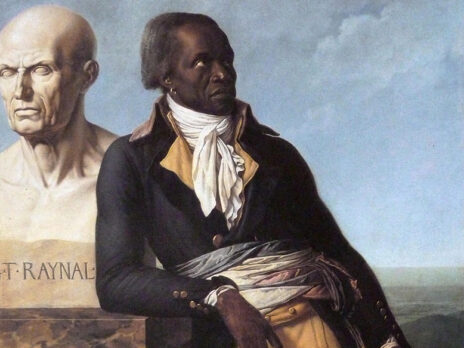On 20 August 2022 a 29-year-old journalist and political activist, Darya Dugina, was assassinated with a car bomb about 12 miles outside Moscow. Dugina was the daughter of the right-wing ideologue and philosopher Alexander Dugin, for whom it was widely assumed the bomb was intended. Dugin is also a scholar of the 20th-century German philosopher, Martin Heidegger. Intelligence sources in the United States believe that the bombing may have been authorised by figures in the Ukrainian government. The Kremlin says it is sure that it was.
Dugin first discovered Heidegger in the 1980s. Young, clever, restless and already a bit crazed, he spent the last grey days of the Soviet Union locked in a darkened room reading philosophy. Heidegger’s writing was not available in Russia, but Dugin had found a microfilm of the philosopher’s masterpiece, Being and Time (1927). He didn’t have access to a microfilm reader, so he rigged up a hand-cranked film projector and read Heidegger’s words – projected on the wall, blinking out of the dark – mesmerised by the ideas that unfolded before him.
Dugin is sometimes called “Putin’s Brain”, although it has never been clear how direct his line to the Kremlin is, just as it remains uncertain who would have benefitted most from his death. But in Russia’s war against Ukraine, it matters for all sides that fundamental ideas – about freedom, existence, destiny and empire – are seen to be at stake. We are often told that this is an “existential” conflict. It is at least worth thinking harder about the philosophical provenance of some of these ideas, and the continuities they suggest between the monstrous ideologies of the 20th-century and those that threaten now.
[See also: Heidegger, the homesick philosopher]
Along with other contemporary right-wing ideologues across Europe and the US (his translator was once married to Richard B Spencer, an American Nazi) Dugin is in no doubt about the existential seriousness of the present moment. Man (and it is “man” in the pantomime gender politics of the new right) has been uprooted, and must rediscover himself. To this end, a politics of soil and belonging is (again) engaged in an epic struggle with the bankruptcy of Western liberalism and capitalism. As the historian Richard Wolin demonstrates in his new book, Heidegger in Ruins, at least some of these ideas can be traced back to Heidegger’s writing.
It all looked very different to begin with. In the rootless world of the 1920s, Heidegger’s ideas about Being (with a capital B, signifying the full meaning of human existence) ripped up the ground of philosophy. Hannah Arendt, his student and sometime lover, described her generation of philosophy students in interwar Germany as “resolute starvelings”. What they were hungry for they did not know until their teacher strode into the classroom in the basement of Marburg University, blew the snow from his fashionably short moustache, and then proceeded to reveal a world they had perhaps sensed but not thought possible to put in language. Forget struggling for the big metaphysical ideas behind the words of philosophers, he told them, the lure of reason had left the modern world poorer, not richer. The truth exists only in our Being. “Being-there” – “Dasein”, in Heidegger’s distinctive terminology – is what matters; there in history, gliding on nothingness, with no other certain knowledge than that of our own death. There is no plot to follow, save the “hidden primordiality” of Being itself.
It was as though a glass wall had shattered. The starvelings looked around and saw themselves anew in a world of shining other existents, catching the sun amid the broken shards of the philosophical tradition. See yourselves for what you are, Heidegger urged, thrown into a world to which you can only respond: then the struggle for an authentic life can truly begin. It helped that the professor spoke in a language that was half philosophy and half poetry. To sit in his classes, as to read his words today, was to be led through pathways of thought. It was the journey and not the arrival that now mattered.
Since that cataclysmic moment, the work of Heidegger has had many afterlives. Existentialism in both its French and theological versions were his most immediate inheritors, with their calls to seize the meaning of being back from the senselessness of modern life. Later the French philosopher Jacques Derrida turned Heidegger’s destruction of metaphysics into a more patient deconstruction of philosophy’s dead ends, while the political philosopher Richard Rorty asked what happens to our social and moral obligations to one another once we accept that these no longer have a firm grounding in reason, and concluded that we might be better for it.
[See also: The four thinkers who reinvented philosophy]
From the beginning, however, Heidegger ensured that his legacy came with a death wish. In 1933 he joined the Nazi Party. The same year, he became rector of Freiberg University. In his rector’s address he committed the university, its staff and students to the future of National Socialism. Nor was Nazism restricted to his administrative job. In his philosophy too he found a new home for Dasein in ideas about race and the German Volk, about work and struggle, space and the earth. It turned out that the rootlessness of contemporary existence could be resolved by the mythologising fictions of National Socialism. There was no space for the existence of Jewish people in these fictions, and soon Heidegger was endorsing the persecution of former friends, colleagues and students. This wasn’t philosophy, an understandably bitter Arendt (who was Jewish) complained in 1946, but a dangerously irresponsible “naturalistic superstition”.
After his denazification hearings at the end of the war, which led to his being temporarily banned from teaching, Heidegger let it be known that his time spent with the Nazis was brief and not that significant. He was, above all, a philosopher, he protested, a man of the mind. On cue his thinking took an even more poetic turn, as he embarked on a linguistic mission to pull existence back from the depredations of an over-technologised and hyper-rationalised world. Gone was the emphasis on struggle and overcoming; in its place was a willed passivity, as though having once wanted to shape the world, he was now content to let it fall about him.
Wolin claims that this philosophical passivity only thinly disguised an ongoing complicity with some of the tenets of National Socialism. In a 1949 lecture on technology Heidegger described how the impersonal forces of technology and rationality continued to “manufacture corpses” after the war, as though men deliberately making genocidal decisions had nothing to do with any of it. “Hundreds of thousands die en masse. Do they die? They perish. They are cut down. They become items of material available for the manufacture of corpses. Do they die?” He intoned, rhythmically, as was his wont: “Hardly noticed, they are liquidated in extermination camps. And even apart from that, in China millions now perish of hunger.” Wolin points out that by 1949 it was already well known that the “hundreds of thousands” were actually six million Jewish people.
In the postwar period, a silence settled over Heidegger’s wartime activity. Fascism was in the room, but as there was no agreement about what shape it now took, it was allowed to stay there, and people learned to accommodate themselves to the occasional inconvenience. Heidegger never addressed the victims of the Nazi genocide, and died in 1976.
[See also: Slavoj Žižek: Why Heidegger should not be criminalised]
In 1988 Derrida interpreted Heidegger’s silence on the Holocaust as a “commandment to think what he himself did not think”, that is, to think through the consequences of Heidegger’s refusal to condemn Auschwitz for ourselves. This generous, if elaborate, strategy stuttered when the “Black Notebooks” were published in 2014. This was the philosophical diary that Heidegger had kept between 1931 and 1970, and it revealed a blatant and ongoing commitment to both anti-Semitism and German exceptionalism, plus a good dose of mystical obscurantism. For all the furore, nobody was really surprised at the contents. By this point, too, Dugin and other intellectual devotees of second-wave fascism and the hard right were explicitly evoking Heidegger’s name and work in support of their politics. Nuance no longer seemed appropriate. “That’s my guy!” Steve Bannon, the former White House strategist for Donald Trump, was reported as exclaiming on spying a copy of a biography of the philosopher in a 2018 interview in Der Spiegel.
Is this the moment of reckoning? Should we be afraid of Martin Heidegger? Wolin’s response to the dishevelled disciples is forensic and disciplined. His is a scholarly book that combines close readings of Heidegger’s key writings with a rich cultural, literary and political history of how National Socialism came to capture the imagination, and then the lives, of Germans in the 1920s and the 1930s. His discussion of how conservative writers such as Heidegger, Ernst Jünger and Oswald Spengler helped shift the meanings of work (Arbeit) from the internationalist left to the nationalist right is particularly illuminating.
The effect of this diligent scholarship is cumulative and repetitive. Heidegger set great store by the rhythmic sound of chopping wood, so the method is appropriate. By the end of the book Wolin has left a solid pile of evidence to the effect that yes, Heidegger’s philosophy is contaminated with the ideology of National Socialism, and that this now has consequences for his legacy.
Wolin’s evidence-based work is its own riposte to the ludic mythomania of the philosopher’s political fanboys. Heidegger’s philosophy took aim at reason, liberalism and democracy, and the patient deliberation and moral judgements that they require. When we talk about our current ideological conflicts being “existential”, the intellectual cadres of the new right like us to believe that it is nations, races and the manifest destinies of ethnically-defined “peoples” that are now at stake. But in the global battle, other big ideas are also on the line – ideas about human rights, freedom, the rule of international law and a politics of plurality. Smugly assuming that these ideas somehow speak for themselves has not played well in recent years. Today’s resolute starvelings are also making it quite clear that they are hungry for something more than a repetition of the same political slogans about reasoned liberalism.
Fascism and nationalism, blood and soil, are not the natural politics of existentialism’s most precious insights. To grasp at living meaningfully in a rootless world – which was Heidegger’s wager – does not naturally lead to war, genocide, camps, forced displacement and unspeakable grief. If it won’t do to simply scold political irrationalism, this is not least because many people also understand that meaningful political action sometimes requires letting go of mastery and certitude.
The paradox of Heidegger’s project of the 1930s, Arendt said in 1946, was that in his rush to make modern man the “Master of Being”, the one-time radical visionary ended up dangerously downgrading the moral and political value of human spontaneity. As Immanuel Kant first taught, without our capacity to act spontaneously, other human characteristics such as “freedom, human dignity and reason” become impossible. Simply put, myths and ideologies stop us responding. Later, Arendt advocated a politics that treasured spontaneity, action and plurality. The moment when we really step out of the dark, she taught, is the moment when we see one another as people who share a world. It’s then that we discover the courage to go beyond ourselves – for the love of that world.
For all their fevered posturing, existential courage is far from being the prerogative of right-wing ideologues, ethnonationalists and misogynists. Just ask the women of Iran and their supporters, or the people of Ukraine as they wait for the last snow to melt and for spring to begin.
Heidegger in Ruins: Between Philosophy and Ideology
Richard Wolin
Yale University Press, 488pp, £25
Purchasing a book may earn the NS a commission from Bookshop.org, who support independent bookshops
[See also: Why our relationship with technology is destroying the planet]
This article appears in the 19 Apr 2023 issue of the New Statesman, Axis of Autocrats






